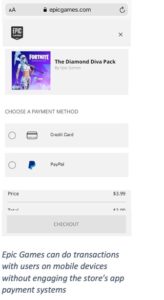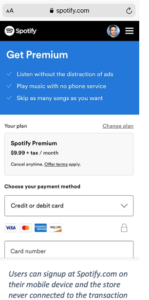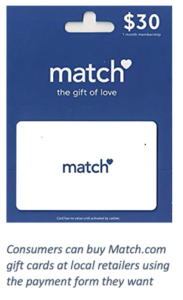Zachary Lilly, Deputy Director of State & Federal Affairs
1401 K St NW, Ste 502
Washington, DC 20005
netchoice.org
House Committee on Commerce Meeting
HB 641 – Provides relative to digital application distribution platforms
3/22/22
Dear Chairman Davis, Vice Chair Hilferty, and members of the House Commerce Committee,
NetChoice asks you not advance HB 641 because it:
- Interferes with private parties and right to contract;
- Represents government picking winners and losers;
- Ignores the multitude of payment options for consumers and developers outside the app stores;
- Increases costs for app developers; and
- Increases costs for Louisiana consumers.
Government interferences with private contracts
Suppose someone decides to build a shopping mall. They build the structure. They build the roads. They advertise the existence of the mall to potential customers. And rather than charging a monthly rental for space in the mall, they enter into a service fee agreement where the mall collects a percentage of each sale. If the business has no sales or gives away its wares, the mall makes no money. If the business makes lots of sales the mall earns its percentage.
We would balk if the government decided to interfere with this private agreement between a mall and the businesses within. But HB 641 does just that — the only difference is that that mall is virtual. Not only is this antithetical to our system of private property and limited government, but it is also ultimately harmful to consumers.
Today, app stores on Apple and Android devices are funded by the service fee agreements between the apps and the app stores. These service fees pay for the data storage of the developer’s apps. These service fees pay for the internet infrastructure to deliver these apps to the customers. These service fees pay for the advertising to potential customers about the app stores. And these service fees are used to offset the costs of the devices making it easier for more customers to access the app stores.
App distributors earn their revenue primarily by entering into fee-sharing agreements with app developers that give them the right to a portion of the price of the app as well as a portion of any microtransactions offered through the app. As the vast majority of apps are now offered at a price point of zero, distributors make the bulk of their income through microtransactions. App distributors then use this money to improve their services, scan for malware, cover operational costs, engage in marketing, and provide customer service, all of which ultimately benefit the app developers themselves.
Currently, many contracts between these parties have provisions that allow app developers to access these digital marketplaces so long as they use the distributor’s payments processing system and share a small portion of the revenue from each transaction. App developers are familiar with this system. In fact, Epic actually launched its own app distributor called Epic Store, which–like other app distributors–charges third-party developers for a percentage of their transactions.
HB 641 picks winners and losers
Today, these contract issues are being fought in the courts and on the negotiating table between multi-billion-dollar businesses. Some of the chief supporters of the bill represent some of the most well-established app developers like Spotify, Epic Games, and Match Group, owner of Tinder.

These are not small businesses. Spotify, the largest music streaming service, currently has a market cap of over $27 billion[1]. Match Group, parent company of some of the largest online dating services, has a market cap is over $28 billion[2]. And Epic Games, one of the largest video game companies, pulled in 840 million[3] last year alone from its ever-growing game store.
These are not down-on-their-luck businesses pushing HB 641 because they want greater fairness in their fee-sharing agreements. They are powerful players trying to get the state government to enable them to avoid paying the service fees to which they agreed.
HB 641 is about benefiting these well-established third-party app developers by forcibly preventing digital application distribution platforms like the Apple App store and Google Play store from creating contracts that limit the extent to which these app developers can offer their own in-app payments processing systems.
There is a reason why ALEC has multiple resolutions and model policies opposing this type of interference with private agreements because it is better to let the private sector and free market make these choices.

There are multiple payment options for consumers and developers
Despite what billion-dollar companies like Spotify and Epic Games that are pushing HB 641 say, there are multiple ways for consumers to make purchases without going through the App Stores of Google or Apple.
For example, right on the iPhone’s web browser, Spotify users can purchase subscriptions directly from Spotify – without going through the app stores. Users can even listen to music via the Spotify webpage without ever having to install the app.
Likewise, Epic Games makes micro-transitions for Fortnite available without ever having to download the game nor the Epic Store. In fact, users can, once again, go directly to the Epic Store webpage on their mobile device and buy V-Bucks or other microtransactions.
At the same time, corporations like Match.com, Spotify and Epic Games make gift cards available for purchase at local drug stores and shopping centers. Here citizens can use essentially whatever payment form they want to buy these gift cards and then redeem them at Match.com, Spotify.com, and EpicGames.com.
This can all be done without any involvement of the Apple and Google stores, so the argument that there is a “monopoly” on payments is false.

Increasing costs for app developers
Since HB 641 would make these contracts illegal, it would force distributors to allow third-party app developers to create and use their own payments processor. As a result, the largest app developers would be able to collect as much money as they please through in-app microtransactions without sharing any of the revenue with app distributors. Considering that app distributors make a substantial portion of their revenue through microtransactions, this would serve as a major blow.
That rise in cost would likely be shouldered by small developers who cannot afford to maintain their own payment processors. App stores would be forced to increase costs for other developers not rich enough to double dip, or downgrade vital security, privacy, quality, and marketing services that small developers depend on.
Increasing costs for Louisiana consumers
HB 641 harms consumers too. Today, part of the cost of these devices is offset by the expectation of service fees from in-app purchases – a loss-leader model akin to razors. With the loss of revenue from in-app transactions, app platforms would need to find another way to cover their costs–including for things like innovative features, day-to-day operations, etc.–and recoup some of their investment. As a result, they would be left with a choice of either saving on costs by reducing the quality of their offerings, redirecting resources that would have otherwise been invested in innovation, or charging higher prices for base downloads, leading to fewer free apps or raising the prices on the devices themselves. HB 641 would leave consumers worse off.
Ultimately, the committee must decide when it is appropriate for a state government mandate to supplant Louisiana’s free market economy. Currently, Louisiana consumers enjoy low prices, a secure and competitive app ecosystem, and developers enjoy a low cost method of taking their great idea and getting it into the hands of millions of customers. HB 641 puts this system to an end for the benefit of the largest app developers. The free market is delivering just as it should. Don’t take that away from Louisianans.
Thank you again for the opportunity to testify and we ask that you not advance HB 641.
Sincerely,
Zachary Lilly
Deputy Director of State & Federal Affairs
NetChoice is a trade association that works to make the internet safe for free enterprise and free expression.
